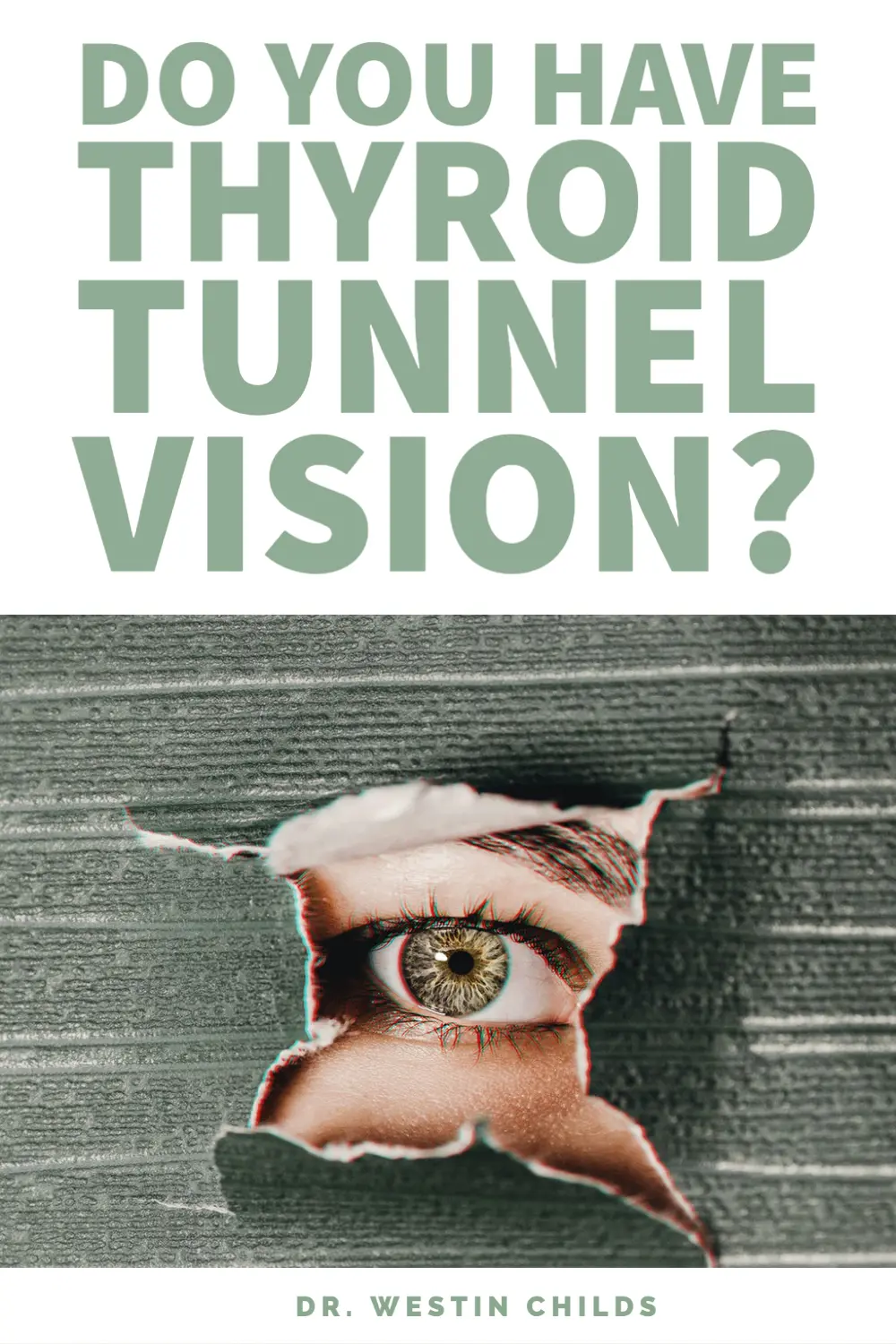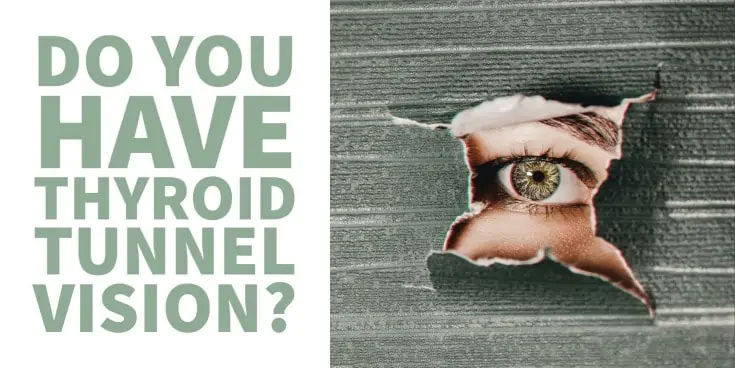What is Thyroid Tunnel Vision?
I’ve been treating thyroid patients for years and during that time I’ve seen a lot of different patients and outlooks on thyroid function in general.
One of the more concerning outlooks is something that I refer to as thyroid tunnel vision.
Thyroid tunnel vision is the idea that EVERYTHING going on with your life is in some way related to your thyroid.
Many of you reading this may fall into this category which is why we are discussing it.
But, before we talk about the symptoms, let me just say that I completely understand why this condition exists.
Thyroid patients have been largely ignored by doctors and even laughed at in many cases.
In addition, you have resources (such as mine) suggesting that the approach to thyroid management is completely wrong.
This leads patients to believe that their doctor is simply incompetent and that the only solution is that they haven’t figured out the solution to their thyroid problem.
While there is DEFINITELY some truth to this, it isn’t the entire story.
While the thyroid plays a very important role in managing your overall health it may surprise you to know that many of you reading this have thyroid issues in addition to OTHER conditions as well.
Focusing solely on your thyroid will NOT treat these other conditions and lead to a state where you are constantly chasing your tail, so to speak.
This is why understanding thyroid tunnel vision is so important.
DOWNLOAD FREE RESOURCES
Foods to Avoid if you Have Thyroid Problems:
I’ve found that these 10 foods cause the most problems for thyroid patients. Learn which foods you should avoid if you have thyroid disease of any type.
The Complete List of Thyroid Lab tests:
The list includes optimal ranges, normal ranges, and the complete list of tests you need to diagnose and manage thyroid disease correctly!
Symptoms you have Thyroid Tunnel Vision:
Below you will find a list of several symptoms that may indicate you suffer from thyroid tunnel vision.
If you find that you have any of these make sure you read to the end to look at the solutions to the problem.
Even if you don’t have these symptoms you should still be aware of them so you don’t develop them in the future!
It’s easy to become cynical as a thyroid patient, especially with the issues I described earlier.
But this cynicism doesn’t typically develop initially and instead takes many years to develop.
#1. You believe that all of your symptoms are related to your thyroid.
It’s important to understand that the thyroid influences just about every system in your body, including other hormones.
This is why the symptoms of hypothyroidism are so widespread and broad.
Hypothyroidism, without question, leads to conditions such as weight gain, fatigue, and even menstrual irregularities.
And these symptoms occur because of your thyroid’s impact on other tissues/hormones.
But, what you need to understand is that there are many other conditions that can mimic the symptoms of hypothyroidism.
Things like vitamin b12 deficiency and iron deficiency can lead to fatigue much like hypothyroidism.
But the difference is that treating your thyroid will NOT treat these conditions as well.
If you want to feel better you have to look at all of these things and not just at your thyroid.
#2. You are constantly reading and learning more about the thyroid but nothing is helping.
It’s great to learn and read more about thyroid function.
But you have to make sure you are getting quality information from a source you can trust.
If you are continually learning and reading and never feeling better, then it may be time to consider a different source of information.
I think sources such as patient groups can be excellent, but they can also be full of misinformation or “rule of thumb”-esque information.
This type of information only applies to individuals, which can be a valuable tool, but gets dangerous when you try to extrapolate a single experience and say it’s relevant to ALL patients with thyroid conditions.
As a general rule, if you’ve been trying the advice of someone for more than 6 months without any relief it may be time to seek out a different source.
And that’s okay.
Not all doctors and patients will be able to help every single person, there’s just too much variability between patients to have that kind of knowledge.
#3. You constantly change your dose of thyroid medication without any relief.
This may be somewhat out of your control as your doctor may be changing your medication without input from you.
But there are certainly some patients who push for various treatments which may or may not be helpful (this is where a knowledgeable doctor can be helpful).
If you find yourself in a situation where you are constantly changing your medication and you really aren’t noticing any improvement in your symptoms then it may be time to look outside of your thyroid.
There is still the chance that you are being mistreated, that is always a possibility, but that risk diminishes over time and with more trial and error.
#4. You focus on relatively inconsequential things such as fillers/dyes in your medication as the source of your problem.
This is a hot-button topic due to the recent changes in certain formulations of NDT.
I need to be careful as I discuss this option because you will see that I myself have many blog posts and videos on how important these fillers can be.
So I don’t want to diminish their importance.
But the fact remains that there are very few people (thyroid patients) in which fillers and dyes play a BIG role in the absorption of thyroid medication.
There’s no doubt that they play some role, but it’s usually minor in most people, probably accounting for no more than 5-10%.
So, when there is a change in thyroid medication formula (like there has been for Nature-throid and NP thyroid recently) does it make sense that this change is the sole cause of everyone’s thyroid problems?

Or is it more likely that these patients probably have other issues at play which need to be diagnosed and managed?
There is probably truth in both situations, but I find it much more likely that fillers/dyes/formulations play a minor role in most people (but they do play a major role in certain individuals).
#5. You’ve accepted that you will never get better or get relief.
There are a number of thyroid patients who feel this way and it’s very unfortunate.
It can definitely be frustrating to be a thyroid patient but you should never feel hopeless.
There are VERY few people who will not see serious improvement in their thyroid symptoms as long as they have someone to help guide them.
Yes, some of you have more complex cases than others and yes some of you may take longer to feel better, but there is room for EVERYONE to see some improvement (even significant improvement).
What should you do about it?
Okay, now that we’ve established some of the symptoms of thyroid tunnel vision we need to discuss what you should do about it.
The good news is that there are several things you CAN do (and should do).
And, as I mentioned earlier, these things are important whether you have thyroid tunnel vision or not.
So, even if you don’t have the symptoms you should still read the following points because they apply to ALL thyroid patients.
Step #1. Get a full set of lab tests that include MORE than just thyroid hormone.
Yes, you absolutely can and should get a full set of thyroid tests which include TSH, free T3, total T3, free T4, reverse T3, and thyroid antibodies (as necessary) but you shouldn’t stop there.
There are necessary and important for thyroid patients.
But you should also look at OTHER factors and hormones as well.
I will come up with a complete thyroid lab testing article/video in the future, but for now, you need to make sure you are getting at least the following:
- Magnesium
- Vitamin B12
- Folate
- Leptin
- Insulin
- Estradiol
- Progesterone
- Iron studies
- Cholesterol
- CMP
- Liver/kidney function
- Inflammatory markers
- Autoimmune markers
- Vitamin D
This broad lab testing set will give you an idea of what OTHER issues you may also have.
In addition, it can give you valuable information about what is causing or contributing to your thyroid problem.
Inflammatory hypothyroidism, autoimmune hypothyroidism, and nutrient deficiency hypothyroidism are all treated differently from one another even though they are all types of hypothyroidism.
Step #2. Don’t neglect your thyroid but focus on other aspects as well.
This topic is really an extension of the one above but it’s still important.
When you focus only on your thyroid you may miss other very important systems in your body which AFFECT your thyroid gland (either directly or indirectly).
What am I talking about?
I’m talking about the following systems/hormones/organs:
- Adrenal health
- Detoxification protocols and regimens
- Gut health
- Lifestyle factors
Thyroid dysfunction can impair these systems which can then cause further issues.
And, in my experience, almost every thyroid patient suffers from issues relating to these tissues.
Most thyroid patients have some sort of gut issue because of how thyroid hormone impacts intestinal motility.
Most thyroid patients have some sort of adrenal problem because of how cortisol and thyroid hormones interact.
In some cases, you may want to spend more time on these areas than your thyroid!
Step #3. Layer therapies on top of each other.
Layering your therapies is probably one of the most important things you can and should be doing.
What this means is that you shouldn’t be doing one isolated type of therapy at a time.
Instead, add therapies on top of each other to get the most benefit.
When you do this you will see a synergistic improvement in your symptoms.
Instead of 1 + 1 = 2 you will see 1 + 1 = 3 or 4.
In this case, diet would be 1 and exercise would be another.
So diet + exercise would result in greater benefits to your symptoms than just one by itself but this occurs in a multiplicative way.
Therapies that you can layer include supplements (check out my thyroid supplements here if you haven’t already), diet, exercise routines, detoxification routines, and so on.
Step #4. Be patient.
Lastly, you need to be patient!
This is probably the hardest part for many people. They want instant relief.
I get it, but that’s just not how your thyroid operates.
In many situations, it took years or decades to get to where you are now.
It doesn’t make sense for you to believe that taking 1 or 2 supplements will reverse all of that damage in 2-3 weeks!
I’ve noticed that most thyroid patients feel much better after they have been compliant with their therapies for around 6 to 12 months.
You also need to be patient when it comes to how frequently you test your thyroid lab studies.
I know many people who want to recheck their labs every 2 weeks to see if they are on the right track.
Do not do this!
It takes at least 6 weeks for the changes you made in your thyroid medication to take effect.
Rechecking sooner than that will not be helpful and can make your situation even more confusing.
Lastly, make sure you evaluate how you are feeling on a month-to-month basis and not a day-to-day basis.
As you make changes to your thyroid regimen you will notice that some days you feel good and some days you feel bad.
This will happen.
Instead of focusing on your day-to-day journey, focus on your month-to-month journey.
Each month you should feel better than the last.
Final Thoughts
As a thyroid patient make sure that you are aware of thyroid tunnel vision so that you can take steps to avoid it.
You can do this by ensuring that you place attention on other aspects of your health including vitamin and nutrient deficiencies and other hormones!
But now I want to hear from you:
Do you have thyroid tunnel vision?
Has it helped/harmed you in some way?
If so, what advice do you have for others?
Do you have any other symptoms that you want to add to my list?
Leave your comments or questions below!








